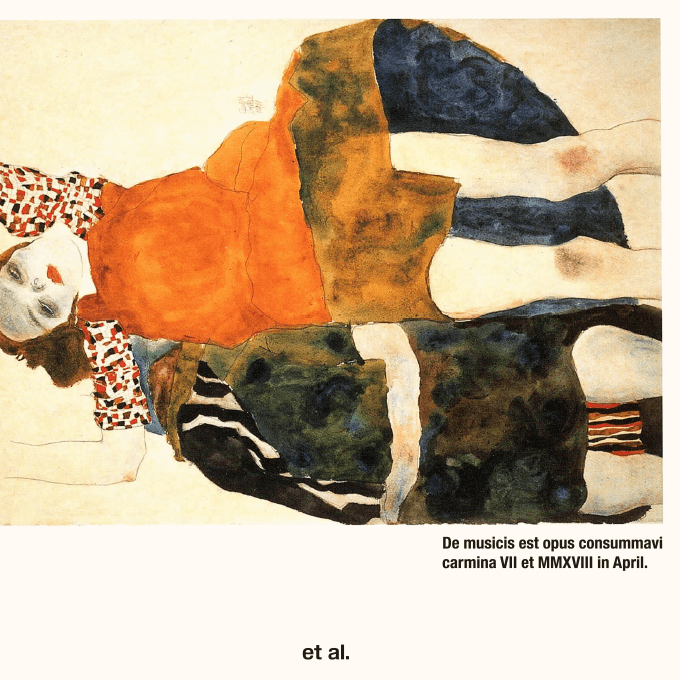et al., an abbreviation from Latin with the meaning ‘and others’, is a collection of seven songs that got released in April 2018 by the techno unit GOATBED, existing out of the brothers Shuuji and Yuuji Ishii.
Tracklist:
1. 闇照らす (Yami terasu, Shine in darkness)
2. MAX DADA
3. THE NIGHTSHIFT
4. 20th MOUSE
5. 一続きに狂った自動演奏 (Ichi tsudzuki ni kurutta jidou ensou, Continual auto-playing)
6. &C
7. the GOAT which eats a GOD
The last release before et al. was the album FANDEATH, also a live-limited release that even got another version a year later. While FANDEATH was a full album with 12 songs, et al. can almost be seen as an EP. Although it was in the planning that the latest release would be released in shops, it eventually only got sold during live shows, till May this year when GOATBED released a new version of the CD. To give some strength to the album title, the duo decided to use some more Latin on the cover to describe what you can expect of et al., something along the lines that 7 musical songs got finished in April 2018.
Taking a closer look to the cover, it is intriguing as it was unexpected. In the past, GOATBED did use the vocalist Shuuji on the cover or some modern artsy-fartsy play with letters, with the exception of The optimist sees the doughnut, the pessimist sees the hole. that got a kaleidoscopic design. For et al. GOATBED has chosen for as a painting that at first gave a vague reminder of some Art Nouveau painting a la Klimt, although this is a watercolour painting instead of oil, titled Two Seated Girls (1911), of Austrian painter Egon Schiele that falls into the genre of Expressionism. But here’s the fascinating thing: he was a protégé of Gustav Klimt before he made the painting that GOATBED decided more than 100 years later to use as an album cover. Enough art history, let’s focus on the here and now.
After being hit by a large wall of music after a more than a minute of an emerging intro during the first track, the recognisable voice of the vocalist creates a soothing wave, as if he is the light beacon in the darkness. Once you float further you will be shaken vigorously by the second number.
For those who possess the release HELLBLAU, might have been asking themselves what M-D stands for. The answer to that question is given on the latest release of GOATBED: MAX DADA. This song consists of the instrumental music that can be heard in M-D, but with the addition of the voice of vocalist Shuuji. As expected of GOATBED, the song got an extra remix and additions and is still a full-on techno track, but much more catchier than its instrumental predecessor.
While you would think that GOATBED eventually processed enough music from the BL game and anime series DRAMAtical Murder in previous releases, in an original version (with minimal adjustments) or completely repackaged, THE NIGHTSHIFT is delivering the vibes that belong to DRAMAtical Murder. Is it too difficult for GOATBED to say farewell to it or do they simply not want to ignore anything they have delivered in the past and still want to involve it in new releases?
Although the music that GOATBED made for the game and anime is more in line with the dance music that they nowadays make, the atmosphere is different from what GOATBED generally bringing forth. In the end, DRAMAtical Murder is the reason why many of the newer fans discovered GOATBED and the transition in the current music of the unit is not that big. That is the case when you look at the first era of GOATBED, at that time the solo project of Shuuji Ishii, before it finally came to a halt in 2009. The so-called good old days does not come back very quickly, except in remix format. Why would you also want to say goodbye to the old work if you can give it a new look? This is something GOATBED is very good at and what you can keep on expecting in the future.
The album lacks pace since there are quite a few tracks on this CD that beams tranquillity. Songs like M-D and &C stand out the most above the others when it comes to tempo, with the former appearing much more powerful and the latter bringing a joyous vibe. But is an album with mostly calm songs a miss? No, the songs contain the signature that describe the current GOATBED: super danceable techno with futuristic characteristics (thanks to the addition of the synthesizer) and the interesting combination of lyrics in English and Japanese, where we learned that the vocalist is a cat. It doesn’t matter if we have to take this release too seriously or not, it causes a smile. While previous releases in most cases contain a cover from the 80s or before, it seems that the duo has mainly opted for their own tracks only for this release.
At the conclusion of the FANDEATH review, the following question was raised: will GOATBED manage to put out a great successor to FANDEATH? The answer is not that easy to give, while the album is much too short with seven songs, it does not compare with FANDEATH. It should be reviewed apart from it and not next to each other.
After finishing up listening to the last song of the CD, the GOAT which eats a GOD, it ends with a feeling of emptiness. It is as if et al. gives the idea that GOATBED is saying farewell. While the unit is still active with performances, the feeling that et al. gives is a bit unsettling and not something that can be found on the other releases of GOATBED. Giving the release the title et al., might reinforce that brainwave by giving out the last songs that didn’t get a proper release. It isn’t the full truth, as some songs did get released as live-limited singles. But if you are a fan from outside Japan, such releases can be seen as not proper releases as you need to be at these live shows in Japan to get a hold of the live-limited releases. The end conclusion after listening to the seven songs is that it wasn’t near enough. But one thing is for sure, et al. doesn’t feel unfinished at all.
Rating: 75/100





















